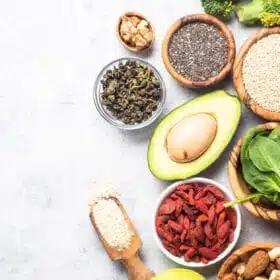That the Nutrition We all know that a healthy diet is a major factor in success, regardless of the athletic goal you are striving for. Accordingly, we often receive questions about healthy foods that are not only rich in healthy macro- and micronutrients, but also have a minimum of taste finesse. We have taken this recurring question as an opportunity to introduce you to a number of healthy foods in this article, which will hopefully make it easier for you to write your shopping list in the future.
Point 1 - Oils
Due to the fact that both saturated and unsaturated fatty acids are essential for our organism, you should make sure that you buy high-quality fats so that you can cover a good part of your daily needs. Vegetable oils are suitable in this regard, as well as those obtained from nuts and seeds, since they are all rich in omega 3 and omega 6 fatty acids. Apart from classics such as sunflower or olive oil, some less common oils should also find their way into your shopping cart. Sometimes, however, you can only find these special oils on the Internet or in well-stocked organic supermarkets.
High quality oils
Sunflower oil
Coconut oil
Walnut oil
Avocado oil
Olive oil
Grape seed oil
Pumpkin seed oil
Linseed oil
Safflower oil
Peanut oil
Rapeseed oil
Point 2 - High fat protein sources
Protein is certainly by far the most important macronutrient for strength athletes. As a result, high-quality protein sources should be at the top of your shopping list. Even though you shouldn't reach for a slice of belly or a curry sausage, it's a good idea to leave chicken and turkey to the left and instead turn to healthy, high-fat protein sources. In this context, nuts and seeds are particularly suitable, as they contain good fats as well as high-quality protein. In addition, fatty fish such as wild salmon or mackerel, which are rich in animal omega-3 fatty acids and essential micronutrients such as zinc, iodine and selenium, also fall into this category.
Plant foods
Avocado
Coconut
Walnut
Cashew kernels
Almonds
Ground nuts
Hazelnuts
Peanuts
Sesame
Sunflower seeds
Unsweetened nut butter
Animal food
Wild salmon
Sea Bass
Mackerel (only limited quantities due to high mercury content)
Bluefish
Trout
Mussels
Bluefin tuna
Whole eggs
Point 3 - Low fat protein sources
Since you should not cover your protein requirement of around 1.5 to 2 grams per kilogram of body weight exclusively with high-fat protein sources, it is obvious that the majority of your protein sources should be low-fat. To prevent the whole thing from becoming monotonous in the long run, constant variety is called for, even if, according to the statements of various experts, it seems as if turkey meat is the only true low-fat protein source. You will be surprised how many different foods are available to you in this regard from the areas of fish, meat and dairy products.
Fish & Seafood
Scallops
Crabs
Shrimp
Haddock
Cobia (officer perch)
Freshwater Umberfish
Grouper
Tilapia (tilapia)
Swordfish (only limited quantities due to high mercury content)
Tuna (only limited quantities due to high mercury content)
Red Snapper
Golden mackerel
Halibut
Cod
Flounder
Plaice
Meat & Dairy
Game meat
Lean beef
Turkey
Topside (pork)
Flank steak (pork)
Beef steak (lean)
Chicken breast
Egg white
Harz cheese
Grainy cream cheese
Low-fat curd cheese
Plant products
Quinoa
Tofu
Tempeh
Point 4 - Healthy alternatives to conventional wheat flour
As part of a healthy diet, it is advisable to avoid refined wheat flour, which not only raises blood sugar levels unnecessarily, but also contains negligible amounts of micronutrients due to the fact that the whole grain does not end up in the mill. Therefore, you should give preference to whole grain products, which, by the way, are excellent for cooking and baking. It's also worth looking beyond local grains, because grains and other products that originated overseas are also ideal for making flour. It is not for nothing that quinoa flour has been used for baking in South American countries for centuries.
Alternative flours
Quinoa flour
Rice flour
Chickpea flour
Oatmeal
Spelt flour
Point 5 - Alternative sweeteners
Admittedly, we all like sweet foods. Unfortunately, this preference cannot always be combined with a healthy lifestyle, so human ingenuity may be called upon. On the one hand, you are of course free to use calorie-free sweeteners, but these usually have other disadvantages, such as an unnatural metallic taste. So that you still don't have to do without sweet things, the following alternatives are available, which, like some oils, can only be purchased on the Internet or in well-stocked retail stores.
Sugar free maple syrup
Coconut sugar
Unsweetened applesauce
Honey
Agave syrup
Item 6 - Fruit
Apart from sweeteners and alternative sweeteners, you can of course also satisfy your sweet tooth with fruit. Not least because of their extremely high micronutrient content, fruits play an immensely important role in a healthy diet, as they provide your body with fiber, vitamins, antioxidants and secondary plant compounds that are needed for numerous physiological metabolism. The immense variety of fruits available to you also guarantees that there will be no monotony in your diet.
Nutritious fruits
Khaki fruit (persimmon)
Figs
Bananas
Grapefruit
Tangerines
Strawberries
Passion fruit
Orange
Guava
Mango
Cherries
Blueberries
Blueberries
Gooseberries
Cranberries
Blackberries
Raspberries
Grapes
Pears
Papaya
Apples
Winter melon
Sugar melon
Honeydew melon
Watermelon
Lemon
Item 7 - Vegetables
In general, when the subject of vegetables comes up, even health-conscious people think of fleeing in a hurry in the face of carrots and Brussels sprouts. But vegetables belong on the menu just as much as fruits because of the micronutrients they contain. Similar to the case of fruit, however, the supermarket offers you such a wide selection of different varieties that you are sure to find some vegetables that you like to eat.
Especially healthy vegetables
Okra pods
Tomatoes
Tomatillos
Eggplant
Paprika
Hot peppers
Pumpkins
Cucumbers
Garlic
Onions
Turnips
Rutabagas
Radish
Beet
Parsnips
Carrots
Alfalfa sprouts
Taro (water bread root)
Earth Artichoke
Potatoes
Lemongrass
Rhubarb
Celery
Ginger
Bamboo shoots
Asparagus
Capers
Brussels sprouts
Leeks
Cabbage
Chinese chives
Watercress
Sareptasenf
Endive salad
Stemmus
Chard
Beetroot
Arugula
Leaf spinach
Collard greens
Kale
Artichokes
Cauliflower
Broccoli
Point 8 - Alternatives to conventional milk
If you don't want to consume whole milk, there are a few alternatives available that are as nutritious as they are healthy.
Unsweetened almond milk
Unsweetened rice milk
Greek yogurt
Low-fat curd cheese
Low fat cow's milk 1.5 percent
Item 9 - Legumes
Legumes are something like the egg-laying lactating sows that Mother Nature has produced in the course of evolution in terms of nutrient content. The various types of beans, peas and lentils are not only rich in carbohydrates and high-quality proteins, but also contain healthy fats and a whole potpourri of essential vitamins, minerals and trace elements. Legumes are therefore ideal for strength athletes and should not be missing in any shopping cart.
Nutritious legumes
Green beans
Lenses
Sweet peas
Soybeans
Mung beans
Kidney beans
White beans
Giant beans
French beans
Peas
Point 10: Good carbohydrates
Oatmeal
Oat groats
Fruit
Vegetables
Sweet potatoes
Brown rice




